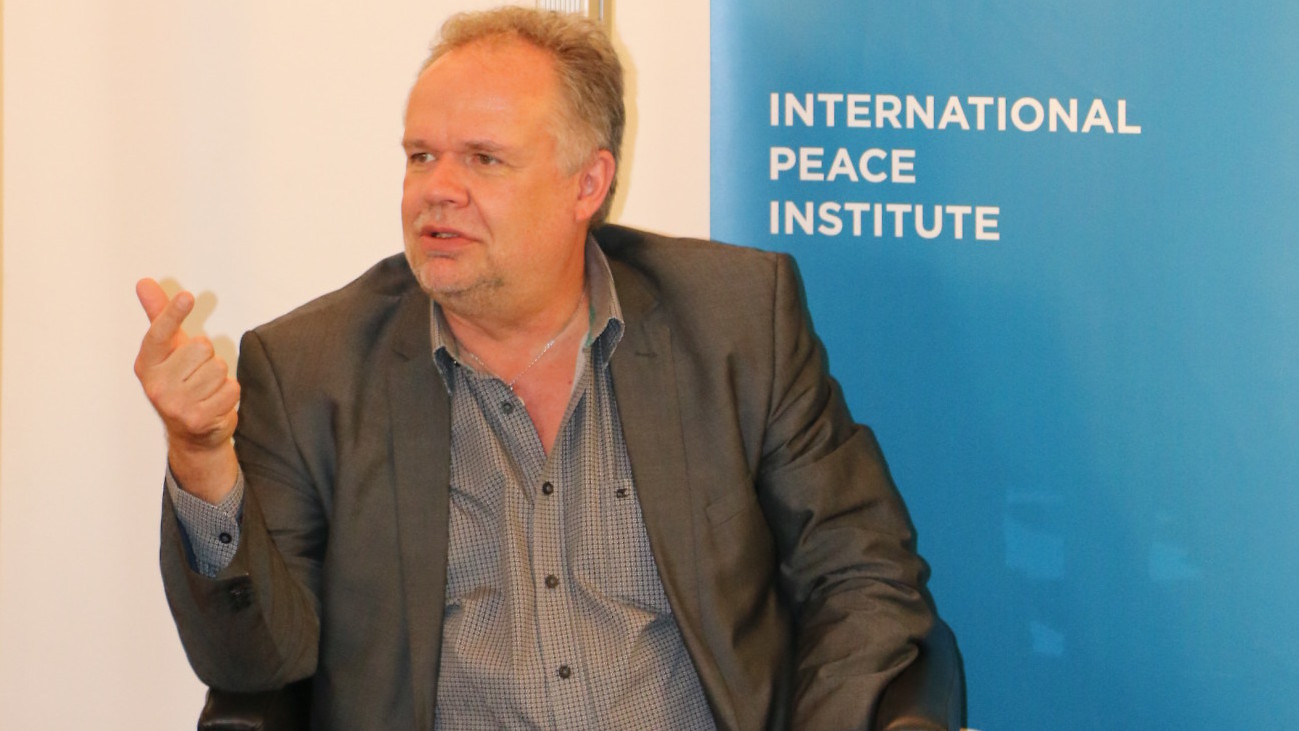“We should thank the one million desperate migrants for exposing a few uncomfortable truths,” said migration expert Kilian Kleinschmidt speaking at IPI’s Vienna office on April 5th. “They have exposed the fact that we are not as tolerant as we thought, EU integration has failed, our social systems have failed, and our colonial system of development and humanitarian assistance has failed.” He observed that within just a few years, the vision of constructing a common European community has been replaced by building fences.
Kleinschmidt, who worked for 22 years at the United Nations High Commissioner for Refugees, including as director of the massive Zaatari refugee camp on the Syrian-Jordanian border, was speaking at the IPI Vienna Office’s inaugural Peace Café. The event, attended mostly by students and young NGO activists, focused on the issue of “People on the Move” and how to cope with mixed migration and integration.
Kleinschmidt criticized the distinction between “good” refugees and “bad” migrants and said that greater legal protection as well as practical assistance should be offered to all categories of people on the move.
He mentioned that a silver lining of the international community’s mishandling of the refugee crisis was that it demonstrated the massive potential of “we the peoples” when it comes to helping people on the move. He highlighted the work of volunteers and civil society actors who have selflessly worked to help those in need.
IPI’s Senior Vice President, Walter Kemp, who chaired the event, pointed out the importance of also looking at those who have been forcibly displaced but who cannot move, like the millions of internally displaced persons. It was stressed that people in refugee camps for long periods of time need to be addressed in a development and not just a humanitarian perspective in order to empower displaced persons rather than victimizing them.
Participants divided up into two groups: one focused on challenges and implications of mixed migration, the second looked at what fosters or hinders integration.
The group on mixed migration focused on the issue of categorization—for example, the connotation as well as the legal consequences of labelling people as refugees or migrants. Some participants underlined the need for greater protection for migrants (particularly the desperately poor), while others cautioned against the uncontrolled influx of everyone who wants to move. The extension of the United Nations Refugee Convention was hotly debated. Kilian Kleinschmidt gave vivid examples, from his past field experience and current business, on creative solutions from different countries and sectors on how to empower refugees and migrants. He has founded a company called Switxboard which is designed to connect people with needs together with those who have solutions.
The break-out group on integration agreed that language, education, legal aid and jobs are among the priorities for successful inclusion. One recent refugee from Syria and another from Afghanistan shared their personal experiences on the challenges of integration in Austria. They recalled, in particular, the sense of isolation, boredom and legal uncertainty during the first few months in Austria. It was also noted that efforts to acclimatize recent immigrants to their new societies without exposing them to citizens of those societies–for example, having separate schools or language classes only for refugees–did not encourage integration. The group brainstormed on how to change the toxic narrative about asylum seekers and refugees. Views and information were also exchanged on good practices for inclusion from national and municipal experiences.
IPI is carrying out a project called “Desperate Migration” which is looking at the root causes of the current massive movement of people around the world, particularly those fleeing conflict. The project includes a number of case studies on past and present refugee situations. IPI is also preparing a number of events in the build up to a High-Level meeting that will take place in New York on September 19 on Managing Large-scale Movements of Migrants and Refugees. Furthermore, the Independent Commission on Multilateralism recently issued a discussion paper on Forced Displacement, Refugees and Migration.








